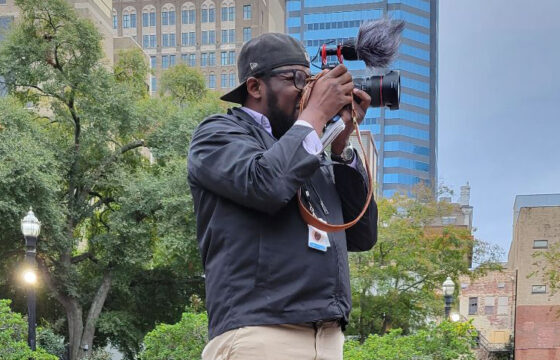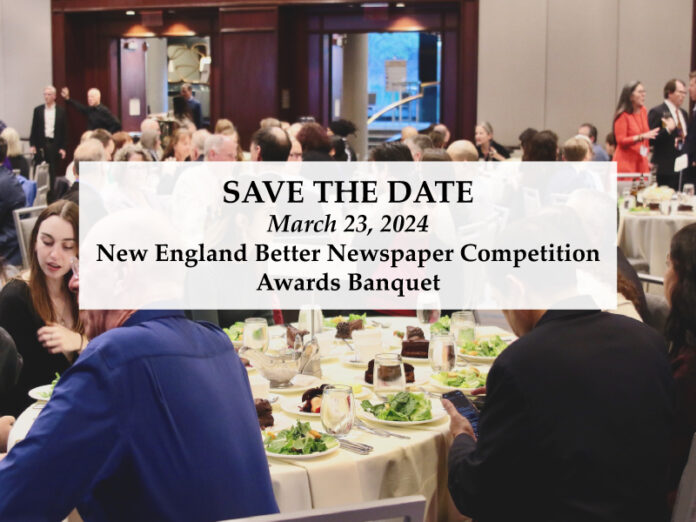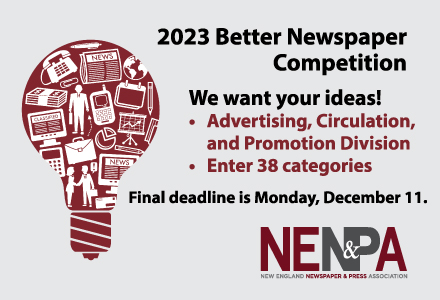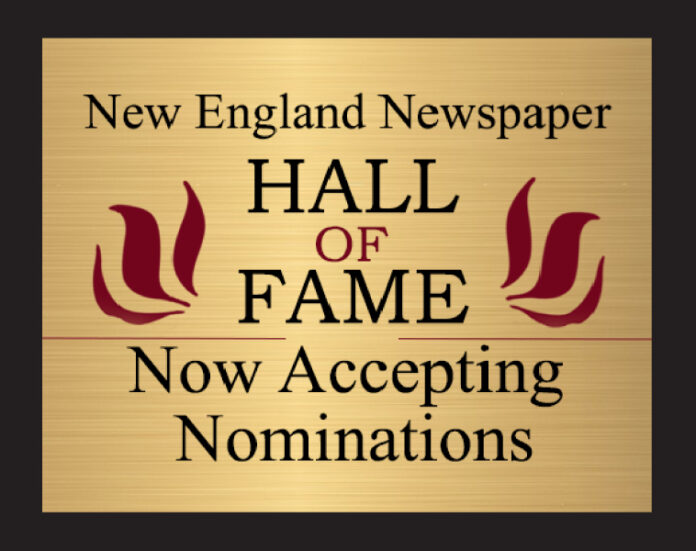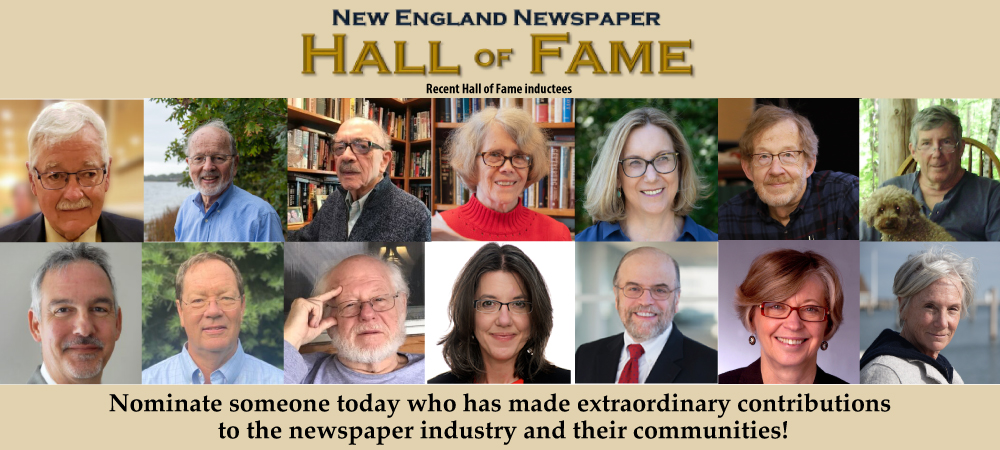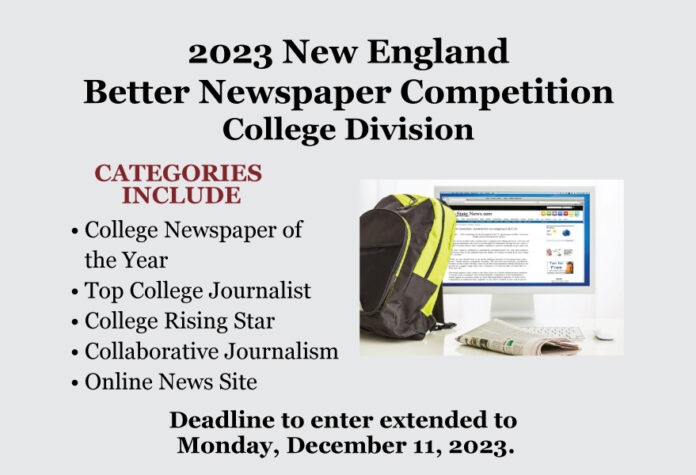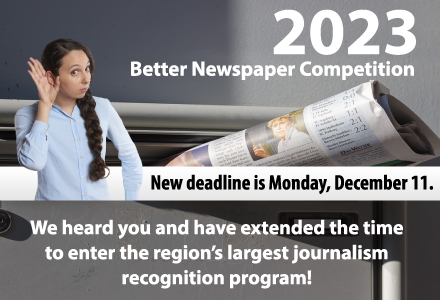Final extension – NENPA Contest portal open through tomorrow, Wednesday, December 13
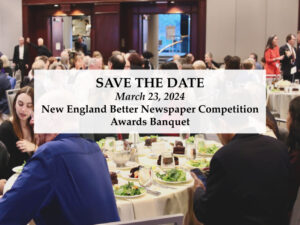 We have received numerous requests for another extension to upload your entries.
We have received numerous requests for another extension to upload your entries.
In light of this, we have extended the deadline to enter all divisions of the 2023 Better Newspaper Competition until tomorrow, Wednesday, December 13 at 11:59 pm. Please note, this is the final extension.
The Better Newspaper Competition Awards Presentation and Banquet is scheduled for Saturday, March 23, 2024. This event will take place during the annual New England Newspaper Convention, which will be held at The Waltham Westin Hotel on March 22-23, 2024. You can book your stay at the hotel now, and the special room rate of $149 per night is available. Don’t miss out on this opportunity!
Producing high-quality publications requires highly skilled, passionate, and determined individuals. Every year, the New England Newspaper & Press Association acknowledges the achievements of the best newspaper professionals in New England through the Better Newspaper Competition.
Work published by NENPA member news organizations during the contest year, August 1, 2022, to July 31, 2023, is eligible for this competition.
The competition has three divisions:
- Editorial/Multimedia/Photography Division – Download Information
- Advertising/Circulation/Promotion Division – Download Information
- College/University Division – Download Information
You can download the information packets and find all the information necessary to prepare your entries, including a list of competitive categories, complete rules and guidelines, and the criteria that each contest category will be judged upon.
You can find additional information on preparing entries – such as how to make PDF files smaller, extract particular pages, and combine several PDF files – on the Frequently Asked Questions page at the end of the packets.
The final deadline to submit entries is Wednesday, December 13, 2023, at 11:59 pm.
We encourage you to showcase your best work and recognize your staff by participating in this year’s competition. It’s also a great opportunity to share ideas and learn from each other.
We wish you the very best of luck in this year’s competition!
If you have any problems or questions while preparing your entries, please email L.Conway@nenpa.com or T.Cleary@nenpa.com.
Show off your successes in marketing, advertising, circulation, and promotion!
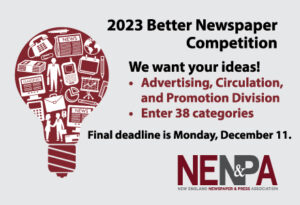 The Advertising/Circulation/
The Advertising/Circulation/
Participation in the contest is a great way to show off your best revenue-generating work, reward and recognize your advertising, graphics, and production staff, and share ideas so we can learn from each other!
There is no limit on the number of entries per category, except in Advertising General Excellence. Newspapers are eligible to compete in six classes:
- Dailies with circulation under 15k
- Dailies with a circulation of more than 15k
- Weeklies with circulation under 5k
- Weeklies with a circulation of more than 5k
- Specialty and niche publications
- News Services and Online News Sites
Publications interested in joining NENPA can find out more information at this link.
Work published by NENPA member news organizations during the contest year, August 1, 2022, to July 31, 2023, is eligible for this competition.
The final deadline to submit entries is Monday, December 11, 2023.
Download the information packet and you will find all of the information necessary to prepare your entries, including a list of competitive categories, complete rules and guidelines, and the criteria that each contest category will be judged upon. You can find additional information on preparing entries – such as how to make PDF files smaller, extract particular pages, and how-to combine several PDF files – on the Frequently Asked Questions page at the end of the packets.
- Advertising/Circulation/
Promotion Division – Download Information
Reminder – the association code to access the contest portal is NENPA and you’ll need to register for the platform even though you may have been registered last year (the system gets wiped clean between contests.) Also, both the email and password fields are case-sensitive.
Link to contest platform: https://newspapercontest.com/
The awards will be presented during the annual New England Newspaper Convention, which will be held at The Waltham Westin Hotel on March 22-23, 2024. The special room rate of $149 per night is available to book now!
For further information please contact Linda Conway, at l.conway@nenpa.com or Tara Cleary, at t.cleary@nenpa.com.
Learn more about the Better Newspaper Competition
Advertising, Circulation, and Promotion Categories:
ADVERTISING
- Local Display Ad, Black and White
- Local Display Ad
- Color Local Online Ad
- Most Creative Use of Small Print Space
- Advertiser Campaign
- Themed Multiple Advertiser Page(s)
- Best Sponsored Content
- Best Native Advertising
- Automotive Display Ad
- Real Estate Display Ad
- Best Holiday Ad
- Best Health Ad
- Newspaper-Designed Advertising Insert
- Best Integrated Campaign for an Advertiser
- Special Section / Advertising Supplement
- Events Online/Virtual
- Events
- Business Innovation
- Best Digital Revenue Building Idea
- Excellence in Revenue Collaboration and Partnerships
- Best Idea for Generating Revenue
SPECIAL RECOGNITION
- Best Ad Designer
- Advertising Director/Manager of the Year
- Advertising General Excellence
NEWSPAPER MARKETING AND PROMOTION
- Advertising Sales Media Kit
- Audience Building Promotion
- Classified Promotion
- Specialty Publication Promotion
- Digital Product Promotion to Advertisers
- Digital Product Promotion to Readers
- Advertiser Promotion for Special Section
- Niche Publication
- Pure Ad Niche Publication
- NIE Program / Promotion
- Newspaper-Sponsored Event Promotion
- Subscription Sales Promotion
- Subscriber Retention Program
- Contests
November Obituaries 2023
CONNECTICUT
Janice Lucas Howard
Tina Ursini
MASSACHUSETTS
Vivian Adams
Alexander (Sandy) Hawes
James Heigham
Gerald O’Connor
Richard (Dickie) Powers
Robert Shelton
MAINE
None Reported
NEW HAMPSHIRE
Katherine (Katy) Burns
Frank Moulin
RHODE ISLAND
None Reported
VERMONT
John Mathews
Steven Patterson
2023 New England Better Newspaper College and University Division deadline extended
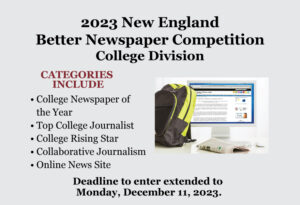 We have already received so many requests for an extension this week that we are extending the deadline to enter the Better Newspaper Competition until Monday, December 11, 2023.
We have already received so many requests for an extension this week that we are extending the deadline to enter the Better Newspaper Competition until Monday, December 11, 2023.
Starting in 2022, colleges and universities in Connecticut, Maine, Massachusetts, New Hampshire, Rhode Island, and Vermont were invited to enter the New England Better Newspaper Competition in 27 competitive categories, including College Newspaper of the Year. Our first year was a resounding success, with 14 schools participating.
Get your school recognized in 2023, the contest is open for entries now and all schools may enter, regardless of membership status, and submit up to 10 entries for a low flat fee of only $125.
We are running a promotion for Academic Membership to the New England Newspaper and Press Association that includes the contest entries. Click here for information on the expanded benefits of Academic Membership.
Work published by student newspapers in print and/or online during the contest year, August 1, 2022, to July 31, 2023, is eligible for this competition.
You can download the information packet for all the information necessary to prepare your entries, including a list of competitive categories, complete rules and guidelines, and criteria that each contest category will be judged upon.
- College/University Division – Download Information
The deadline to submit entries is extended to Monday, December 11, 2023.
Awards will be presented during the annual New England Newspaper Convention, which will be held at The Waltham Westin Hotel on March 22-23, 2024. The special room rate of $149 per night is available to book now!
We encourage you to participate in the Better Newspaper Competition to recognize your students’ best work, compete with peers, and compare your coverage and publication.
We wish you the very best of luck in this year’s competition!
For further information, please get in touch with students@nenpa.com.
Learn more about the Better Newspaper Competition
New deadline for the 2023 Better Newspaper Competition!
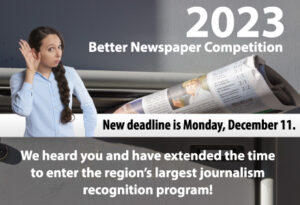
We have extended the deadline to enter the region’s largest journalism recognition program to Monday, December 11, 2023.
It takes highly skilled, passionate, and determined individuals to produce high-quality publications. Each year the New England Newspaper & Press Association recognizes the achievements of the very best newspaper professionals in New England in the Better Newspaper Competition.
The Better Newspaper Competition is the largest and most comprehensive journalism recognition program in New England.
Work published by NENPA member news organizations during the contest year, August 1, 2022, to July 31, 2023, is eligible for this competition.
The competition has three divisions:
- Editorial/Multimedia/
Photography Division – Download Information - Advertising/Circulation/
Promotion Division – Download Information - College/University Division – Download Information
Download the information packets and you will find all of the information necessary to prepare your entries, including a list of competitive categories, complete rules and guidelines, and the criteria that each contest category will be judged upon.
You can find additional information on preparing entries – such as how to make PDF files smaller, extract particular pages, and combine several PDF files – on the Frequently Asked Questions page at the end of the packets.
The deadline to submit entries is extended to Monday, December 11, 2023.
Awards will be presented during the annual New England Newspaper Convention, which will be held at The Waltham Westin Hotel on March 22-23, 2024. The special room rate of $149 per night is available to book now!
We encourage you to participate in this year’s Better Newspaper Competition to show off your best work, reward and recognize your staff, and share ideas so we can learn from each other!
We wish you the very best of luck in this year’s competition!
If questions arise while preparing your entries, please email L.Conway@nenpa.com or T.
Free Branded Content Sales Boot Camp on December 5 and 6
 The Branded Content Project is presenting a free two-day online Sales Boot Camp on December 5 and 6. All local media professionals interested in gaining valuable branded content sales advice and sponsorship opportunities are invited to join and sign up today!
The Branded Content Project is presenting a free two-day online Sales Boot Camp on December 5 and 6. All local media professionals interested in gaining valuable branded content sales advice and sponsorship opportunities are invited to join and sign up today!
This free, two-day bootcamp will consist of two group calls (one hour each), in addition to one-on-one sales support and consulting, access to turnkey sales products and custom content solutions, the Branded Badge Certificate Program, and an excellent opportunity to network and brainstorm with other local media organizations. The boot camp takes place on Tues., Dec. 5th at 12 p.m. EST and Wed., Dec. 6th at 12 p.m. EST.
Media professionals will get early access to our newest content series, Mind Matters, which focuses on mental health, as well as learn how to sell our other lifestyle content series. We also bring in coaches and sales experts who can give participants real-world advice and actionable takeaways.
If you want to spruce up your sales strategy and be positioned to start 2024 strong, the Branded Content Sales Boot Camp will help you on your way to new revenue!
The Branded Content Project is designed through a strategic partnership between the Local Media Association, the Local Media Consortium, and the Facebook Journalism Project to help facilitate additional growth, engagement, and revenue success for more publishers of all shapes and sizes.

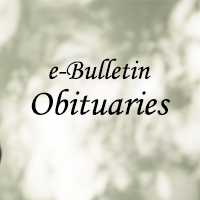
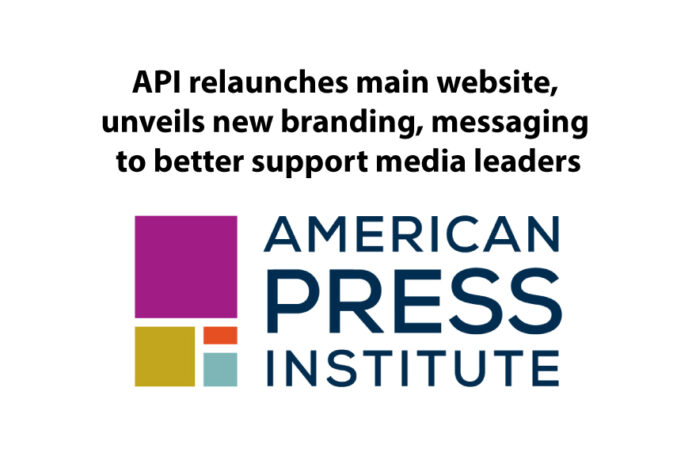
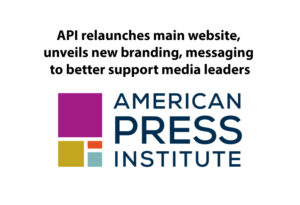 The American Press Institute officially unveiled new branding and messaging on Dec. 5 and relaunched its main website to provide users with a better experience and to more clearly emphasize its support for local and community-based media.
The American Press Institute officially unveiled new branding and messaging on Dec. 5 and relaunched its main website to provide users with a better experience and to more clearly emphasize its support for local and community-based media.